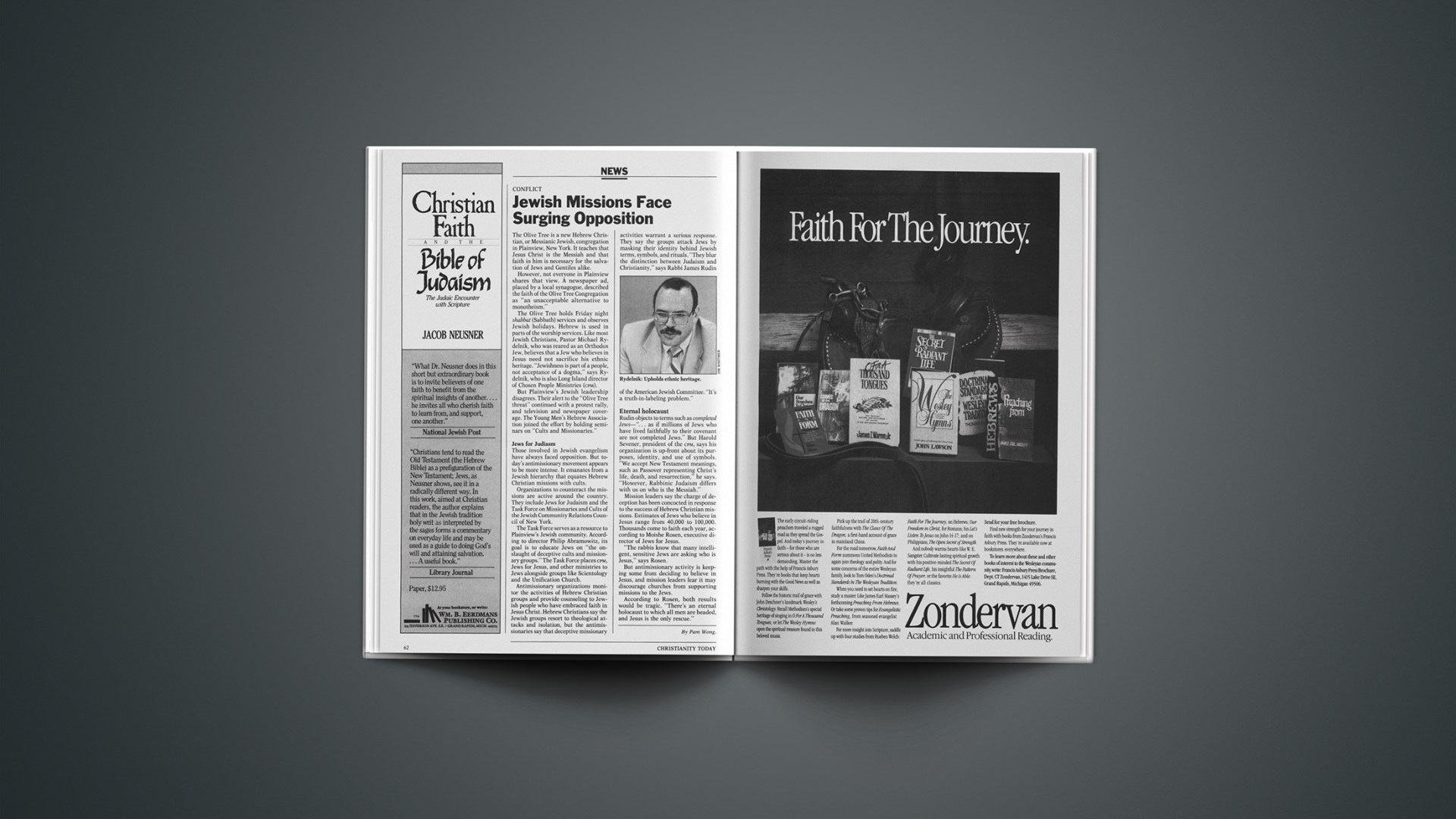CONFLICT
The Olive Tree is a new Hebrew Christian, or Messianic Jewish, congregation in Plainview, New York. It teaches that Jesus Christ is the Messiah and that faith in him is necessary for the salvation of Jews and Gentiles alike.
However, not everyone in Plainview shares that view. A newspaper ad, placed by a local synagogue, described the faith of the Olive Tree Congregation as “an unacceptable alternative to monotheism.”
The Olive Tree holds Friday night shabbat (Sabbath) services and observes Jewish holidays. Hebrew is used in parts of the worship services. Like most Jewish Christians, Pastor Michael Rydelnik, who was reared as an Orthodox Jew, believes that a Jew who believes in Jesus need not sacrifice his ethnic heritage. “Jewishness is part of a people, not acceptance of a dogma,” says Rydelnik, who is also Long Island director of Chosen People Ministries (CPM).
But Plainview’s Jewish leadership disagrees. Their alert to the “Olive Tree threat” continued with a protest rally, and television and newspaper coverage. The Young Men’s Hebrew Association joined the effort by holding seminars on “Cults and Missionaries.”
Jews For Judiasm
Those involved in Jewish evangelism have always faced opposition. But today’s antimissionary movement appears to be more intense. It emanates from a Jewish hierarchy that equates Hebrew Christian missions with cults.
Organizations to counteract the missions are active around the country. They include Jews for Judaism and the Task Force on Missionaries and Cults of the Jewish Community Relations Council of New York.
The Task Force serves as a resource to Plainview’s Jewish community. According to director Philip Abramowitz, its goal is to educate Jews on “the onslaught of deceptive cults and missionary groups.” The Task Force places CPM, Jews for Jesus, and other ministries to Jews alongside groups like Scientology and the Unification Church.
Antimissionary organizations monitor the activities of Hebrew Christian groups and provide counseling to Jewish people who have embraced faith in Jesus Christ. Hebrew Christians say the Jewish groups resort to theological attacks and isolation, but the antimissionaries say that deceptive missionary activities warrant a serious response. They say the groups attack Jews by masking their identity behind Jewish terms, symbols, and rituals. “They blur the distinction between Judaism and Christianity,” says Rabbi James Rudin of the American Jewish Committee. “It’s a truth-in-labeling problem.”
Eternal Holocaust
Rudin objects to terms such as completed Jews—“… as if millions of Jews who have lived faithfully to their covenant are not completed Jews.” But Harold Sevener, president of the CPM, says his organization is up-front about its purposes, identity, and use of symbols. “We accept New Testament meanings, such as Passover representing Christ’s life, death, and resurrection,” he says. “However, Rabbinic Judaism differs with us on who is the Messiah.”
Mission leaders say the charge of deception has been concocted in response to the success of Hebrew Christian missions. Estimates of Jews who believe in Jesus range from 40,000 to 100,000. Thousands come to faith each year, according to Moishe Rosen, executive director of Jews for Jesus.
“The rabbis know that many intelligent, sensitive Jews are asking who is Jesus,” says Rosen.
But antimissionary activity is keeping some from deciding to believe in Jesus, and mission leaders fear it may discourage churches from supporting missions to the Jews.
According to Rosen, both results would be tragic. “There’s an eternal holocaust to which all men are headed, and Jesus is the only rescue.”
By Pam Wong.










